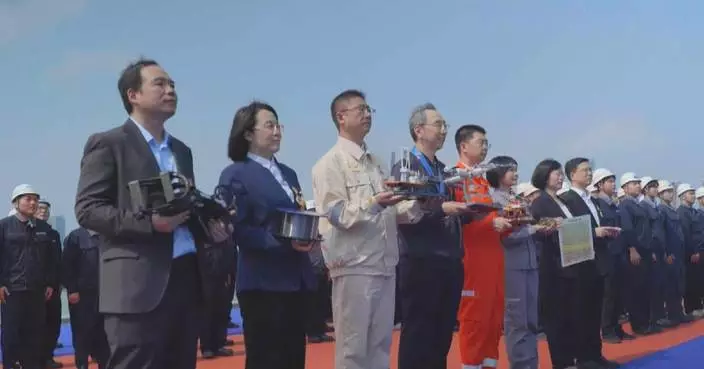The 2024 Hong Kong International Dragon Boat Races concluded on Sunday, capped by a thrilling final race that determined the champion.
Over the course of two days, Victoria Harbor witnessed a spectacular display of athleticism as more than 4,000 athletes from over 170 teams representing 12 countries and regions fiercely competed in the ancient sport of dragon boating.
Preliminary estimates indicate that over 130,000 local residents and tourists gathered to cheer on the competitors, creating a vibrant atmosphere along the harbor.
This year's competition featured a special highlight — "Celebrating the 75th Anniversary of the People's Republic of China Cup." The competition was contested on the second day, exclusively featuring teams that achieved notable results on the first day.
The championship was claimed by the Shunde Dragon Boat Team. The second and third places were secured by teams from Thailand and Taiwan island respectively.
"Our team has participated in international competitions before, but this one is particularly special. It marks our motherland's 75th birthday. Representing our country fills me with immense pride," said Luo Xuan, a member of the Shunde Dragon Boat Team.
"Many international dragon boat athletes have come to Victoria Harbour to compete. It's such a beautiful setting, and as a resident of Hong Kong, I'm thrilled and delighted. I hope to spread Chinese traditional culture, especially the culture of dragon boating, to the world," said a local resident.

Hong Kong dragon boat races draw crowds, showcase cultural tradition
The sixth edition of Shanghai's iconic "5·5 Shopping Festival" kicked off on Thursday, alongside the 2025 International Consumption Season, in a renewed push to boost domestic demand and revitalize consumer spending.
Co-hosted by the Ministry of Commerce, China Media Group (CMG), and the Shanghai Municipal Government, the event promises a vibrant mix of promotional campaigns, themed events, and immersive retail experiences across the city's commercial districts.
Centering on the theme "Quality Consumption, Demand Creation," the festival targets four key consumer sectors: services, big-ticket purchases, inbound spending, and emerging consumption trends. It also highlights new economic frontiers such as the debut economy, the silver economy, the nighttime economy, and the ticket-based economy—aimed at unlocking consumer potential and enhancing Shanghai's commercial vitality through new product launches, senior-friendly services, dynamic nightlife, and spending on cultural activities.
The festival launch ceremony also included the Fourth International Consumption Center City Forum. In a video address, Marwan Ahmed Bin Ghalita, Acting Director General of Dubai Municipality, expressed hopes for deeper cooperation between Shanghai and Dubai as the two metropolises mark the 25th anniversary of their sister-city relationship. He emphasized their shared vision for urban development and prosperity.
Another highlight of the festival was the debut of the "CMG Select: Shanghai Pavilion." Combining celebrity hosts, culture, art, and premium brands, the pavilion leverages CMG's influential media platform to energize consumer activity and support Shanghai's drive to become a world-class consumption center.
The shopping festival will run through the end of June, with over 1,000 companies and thousands of brands set to launch more than 1,000 special events.
The 2025 International Consumption Season is a flagship event under the "Shop in China" campaign. Jointly launched by the Ministry of Commerce and five other government departments, the initiative will mobilize regions across the country to spotlight premium international and domestic goods. It will feature product debuts, first launches, and consumer-friendly measures to help both domestic shoppers and inbound tourists access high-quality global merchandise and enjoy top-tier services.

Shanghai launches major shopping festival to boost consumer spending




















































